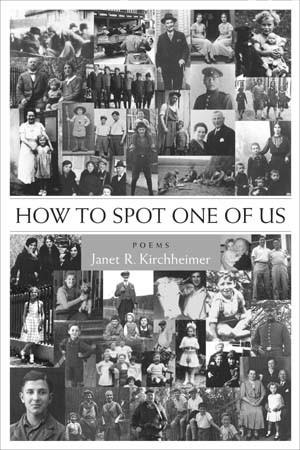How to Spot One of Us - A Collection of Poetry
By Janet R. Kirchheimer

CLAL, the National Jewish Center for Learning and Leadership, 2007
ISBN 13: 978-0-9633329-8-1, 114 pages
To order, visit the CLAL site or purchase it at Barnes and Noble
The Hidden Child Review
Janet Kirchheimer, a daughter of survivors, evokes powerful images of the Holocaust’s impact on her family through subtle yet heart-rending poetry that we, survivors and children of survivors, recognize instantly. A gifted poet, Janet gives words to our silences, our rage, our nightmares, our alone-ness. There is little respite from living with the Holocaust. It exists in life’s choices, as in “Things My Father Won’t Do—wear striped clothing/go to the doctor/tell me his dreams/live in a house surrounded by a fence” and it lurks at family gatherings, “My father watches war documentaries, footage of people arriving for the selections at Auschwitz/I think he hopes to see his family…” and at picnics bereft of relatives. It jolts us at doctors’ visits and in pizza parlors. The recurrent flashes of the survivors’ memories are the imprinted images in this poet’s soul. What we feel, she senses—and collects into a stirring narrative—without appropriating the survivor’s pain as her own: “You remain right behind my eyelids…//…as I fly/on my own.” Through her stories—of her maternal grandmother, Oma Strauss, who bought her mother red Mary Jane shoes on the way home from the American Consulate, or the boys’ choir of the Levetzowstrasse shul—she evokes images of the engulfing evil while offering a legacy of love. Poet Mary Stewart Hammond says, “How to Spot One of Us is a disquieting meditation about taking possession of others’ narratives in order to understand oneself.”This review originally appeared in The Hidden Child, Vol. XVI, 2008.
The Journal of American Holocaust Survivors and Their Descendants Review
Review by: Sally Lipton Derringer
There is every reason to read How to Spot One of Us. There’s the pleasure of witnessing a poet unafraid to listen, so that she may truly hear. There’s the grace with which this poet takes what she hears and makes it speak. As we listen to this talented new voice that speaks so eloquently for those who lost their lives in the Holocaust, for those who have lived through it, and for their children, we cannot help but hear. It is not often that we get the opportunity to learn what we thought we already knew.
There are poems that speak about her family’s experiences and poems that speak about Ms. Kirchheimer’s personal experiences. In poems such as “Lunchtime,” “Grand Central Station,” “At the Butcher’s,” and “Jury Duty,” the objects and activities of the everyday world become chilling representations of the Holocaust. A pizza oven turns sinister; riding a crowded subway or taking a number at the butcher shop induces sudden panic; waiting to find out if one has been selected for jury duty hits a little too close to home — home being that place where the stories of the Shoah have been passed down from parent to child and survive. The poems are a kaddish for her family, as Rabbi Irving “Yitz” Greenberg states in his Introduction, and give “life to the dead and compassion to the living.”
In this expertly crafted, profoundly moving book of poems, surely destined to be one of the most important books of the year, Ms. Kirchheimer proves that the voices of the Holocaust can never be silenced.
This review originally appeared in The Journal of American Holocaust Survivors and Their Descendants.
Jewish Book World Review
Written in plain, sometimes sparse free verse, How to Spot One of Us brooks no soft words to temper the harsh reality of the actual events of the Holocaust or the horrific memories left for its survivors and their relatives. The title poem clearly elucidates the accents, fear of absence of a loved one, forearms with numbers described to the neighbors as “phone numbers,” conversations without mentioning the past, and those who “...wish words could just be words, wish ‘camp’ / or ‘selection’ didn’t make us flinch...” In “My Father’s Sister,” there’s no distracting fantasy to help alleviate painful recollection, “and the yellow brick road / did not lead to the gates / of the Emerald City. / It led to the gates of Auschwitz.” “Retelling is a powerful poem equating the Egyptian exodus with the need to leave Germany, “...in every generation, / one must regard himself as if he had personally gone out from Egypt.” The three memorable parts of this poetry collection span the war, emigration, and the past merging into the present. Let us never forget—How to Spot One of Us is a unique contribution to assure that the world does exactly that. DS
This review first appeared in Jewish Book World, issue 26:1 (spring 2008.) http://jewishbooks.wordpress.com/
To read some poems from How to Spot One of Us, see http://www.theverylongview.com/WATH/poetry/poetry14.htm.
Copyright
© 2010 Judy Cohen, all rights reserved.